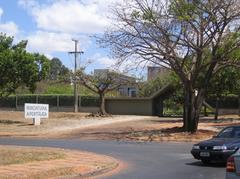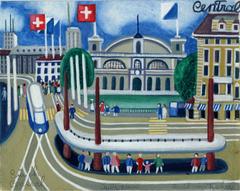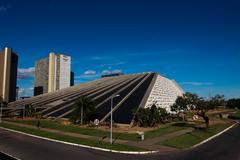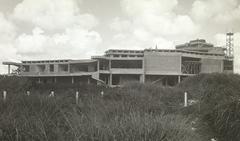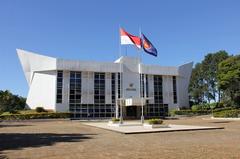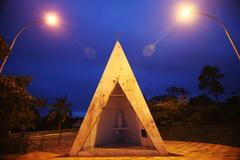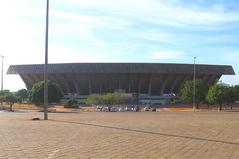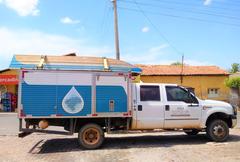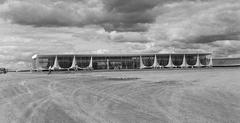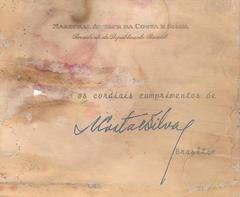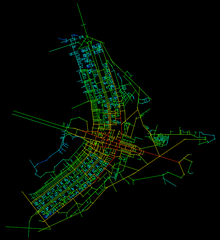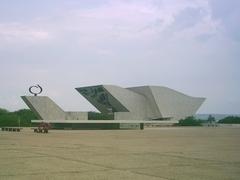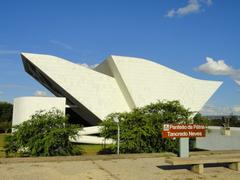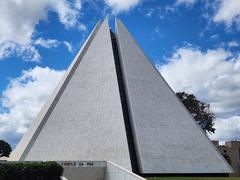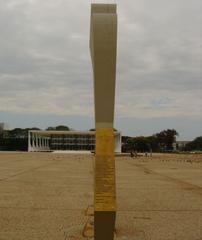
Library Acadêmico Luiz Viana Filho: Visiting Hours, Tickets, and Guide to Brasília Historical Sites
Date: 04/07/2025
Introduction
Standing proudly at the heart of Brasília’s political center, the Biblioteca Acadêmico Luiz Viana Filho is both a custodian of Brazil’s legislative memory and a vibrant cultural institution. With roots tracing back to 1826 as the Livraria do Senado, this library has evolved alongside the nation, bearing witness to major historical and democratic transformations (Wikipedia). Today, its vast collection, rare archives, and modern facilities make it an essential stop for scholars, students, and visitors exploring the rich tapestry of Brazilian history.
This comprehensive guide details the library’s history, significance, collections, practical visitor information, and its role within Brasília’s constellation of historical sites. Whether you’re researching, sightseeing, or seeking cultural enrichment, the Biblioteca Acadêmico Luiz Viana Filho is a rewarding destination.
Table of Contents
- Introduction
- Origins and Early History (1826–1889)
- Growth and Modernization in the 20th Century
- Automation and Expansion (1970–1999)
- Collections and Rare Works
- Cultural and Scientific Contributions
- Visitor Information: Hours, Tickets, Accessibility
- Structure and Team
- National and International Relevance
- Luiz Viana Filho Collection: Highlights and Visitor Guide
- Library at the University of Brasília: A Complementary Experience
- FAQ – Frequently Asked Questions
- Conclusion and Recommendations
- References
Origins and Early History (1826–1889)
Founded on May 18, 1826, as the Livraria do Senado, the library was established during the Empire of Brazil to support the legislative process (Wikipedia; CRB6). Initially located in the Palácio Conde dos Arcos, Rio de Janeiro, it housed fundamental documents from Brazil’s colonial era and the early Republic (Agência Brasil).
Growth and Modernization in the 20th Century
Throughout the 20th century, the library underwent significant modernization. The 1950s saw expanded staffing and careful growth of the collection (Wikipedia). The capital’s move to Brasília in 1960 brought the library to its current home in the Palácio do Congresso Nacional. Legislative reforms in the 1960s professionalized its management, and the library continued to serve even during periods when the Congress was closed under military rule.
Automation and Expansion (1970–1999)
The 1970s and 1980s marked a period of robust expansion, with thousands of new volumes added annually. The library was renamed in honor of Senator Luís Viana Filho in 1979, accompanied by facility upgrades (CRB6). In the following decades, it embraced digital transformation: launching its online catalogue in 1997, automating management systems, and expanding user spaces (Wikipedia).
Collections and Rare Works
With over 500,000 volumes, the library’s holdings are particularly strong in law and social sciences (Agência Brasil). Highlights include:
- The “Novus Orbis” (1633), the oldest book in the collection
- Historical documents such as records from the Paraguayan War and the Treaty of Tordesillas
- The Luiz Viana Filho Collection, featuring 11,700 volumes, including rare first editions by Machado de Assis, Eça de Queiroz, and other literary icons (Wikipedia)
Digitization initiatives are making thousands of rare works accessible online, balancing preservation with broader access (Agência Brasil).
Cultural and Scientific Contributions
The library supports the Brazilian Senate and Congress as a parliamentary library but also serves broader academic and public interests. It organizes cultural events, exhibitions, and maintains a robust digital library (Senado Federal). Accessibility is a priority, with audio materials, multimedia resources, and adapted spaces. The library also curates an extensive newspaper clippings collection, with millions of articles from major Brazilian newspapers (Agência Brasil).
Visitor Information: Hours, Tickets, Accessibility
- Location: Palácio do Congresso Nacional, Praça dos Três Poderes, Brasília - DF
- Opening Hours: Monday to Friday, 8:00 AM to 12:00 PM (verify updates on the official website)
- Admission: Free. Book borrowing is limited to Senate staff, but all visitors can consult materials on-site.
- Accessibility: Facilities are adapted for visitors with disabilities, with audio resources and accessible environments.
- Getting There: Easily accessible by public transportation; located near major landmarks such as the Esplanada dos Ministérios.
Structure and Team
As of April 2024, the library’s team comprises 16 professional librarians, led by Cintia Mara Machado Ferreira da Costa (Wikipedia). The 3,250 m² facility features dedicated spaces for research and preservation.
National and International Relevance
Recognized as one of Brazil’s foremost legislative and historical documentation centers, the library is an essential resource for researchers from Brazil and abroad, contributing to the preservation and dissemination of the nation’s political, legal, and social heritage (Agência Brasil).
Luiz Viana Filho Collection: Highlights and Visitor Guide
Collection Highlights
The Luiz Viana Filho Collection contains 275 rare works from the 18th to 20th centuries, focusing on Brazil’s exploration, political development, abolitionism, and literature. Highlights include works by José de Alencar, Ruy Barbosa, Joaquim Nabuco, and Machado de Assis—all biographed by Luiz Viana Filho.
Visiting the Collection
- Location: Ground floor, Biblioteca do Senado Federal, Palácio do Congresso - Anexo II
- Hours: Monday to Friday, 9:00 AM to 5:00 PM (closed weekends and holidays; check the Senate website for updates)
- Tickets: Free, with ID and security screening required for entry
- Accessibility: Wheelchair access and assistance available
Guided Tours and Events
Guided tours are available through the Senate’s educational programs; booking is recommended for groups. The library periodically hosts exhibitions, lectures, and book launches. While photography is restricted inside, the Senate complex offers excellent architectural photo opportunities.
Catalogue
The collection is documented in the “Catálogo de Obras Raras e Valiosas da Coleção Luiz Viana Filho,” featuring bibliographic details, author biographies, and reproductions. The catalogue is available for purchase onsite and online.
Library at the University of Brasília: A Complementary Experience
Overview
The Library Acadêmico Luiz Viana Filho at the University of Brasília (UnB) is a major academic hub, serving students, researchers, and visitors. Established in 1962, it aligns with Brasília’s modernist heritage and educational aspirations.
Location and Access
- Address: UnB Campus, Asa Norte, Brasília - DF, 70910-900
- Hours: Monday to Friday, 8:00 AM – 10:00 PM; Saturday, 8:00 AM – 2:00 PM
- Admission: Free; some areas may require university ID
Facilities
- Reading rooms, group study spaces, digital resources, rare book archives
- Information desk, lockers, printing services
- Accessible facilities with ramps and elevators
Visitor Tips
- Identification may be requested at entry
- Photography allowed in public areas, no flash
- Guided tours available by appointment (contact page)
FAQ – Frequently Asked Questions
What are the library’s visiting hours?
Monday to Friday, 8:00 AM to 12:00 PM at the Senate location; different hours at UnB.
Is admission free?
Yes, admission is free; borrowing privileges are restricted to Senate staff.
Are guided tours available?
Yes, check the library’s website or contact for scheduling.
Is the library accessible?
Yes, with adapted facilities and services for visitors with disabilities.
Can I take photos?
Restricted inside the library; allowed in public areas.
What other attractions are nearby?
The National Congress, Esplanada dos Ministérios, and Museu Nacional are within walking distance.
Conclusion and Recommendations
The Biblioteca Acadêmico Luiz Viana Filho is a cornerstone of Brazilian history and culture, offering unparalleled resources for research and an immersive visitor experience. Its location amidst Brasília’s iconic landmarks, combined with free admission and accessible services, makes it a must-visit for anyone interested in Brazil’s legislative evolution and cultural heritage. Enhance your visit by checking for special events, using the library’s digital resources, and exploring nearby attractions.
Stay informed about news and events by following the library’s official channels and downloading the Audiala app for interactive cultural content. Visiting this library unlocks not only the story of Brazil’s past but also the enduring value of knowledge and public engagement.
For images, virtual tours, and additional resources, visit the library’s official website and social media channels.



